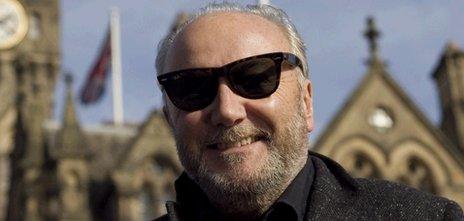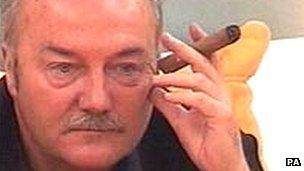Profile: George Galloway
- Published

George Galloway's Bradford West campaign focused on the Afghan war
George Galloway's victory in the Bradford West by-election is the latest chapter in a remarkable political career, proving lightning can strike twice.
The 57-year-old's victory came out of the blue in what should have been a safe Labour seat, even taking into account the occasional eccentricities of by-elections.
And it proves once again, that whether you admire him, loathe him or lampoon him - never, ever underestimate the man who first rattled Labour by recording one of the biggest shocks in recent political history at the 2005 General Election.
Perhaps it was the holiday home in the Algarve, perhaps the fondness for Cuban cigars, but "gorgeous George" seems to get right up the nose of those who count themselves among his critics.
Equally, though, he can command an audience with his oratory. It has made him one of the most colourful figures throughout his political life in Scotland, London's East End and Westminster.
The Bradford win confounds those who had thought his failures to get elected in the 2010 General Election and the 2011 Scottish Parliament election meant he was ready to concentrate on his work as a talk radio host and leave politics to the big parties.
There was little sign of the victory to come in the build-up to election day, as Mr Galloway - the celebrity among the candidates - toured the by-election with loudspeaker, opposing spending cuts, warning against military action in Iran and pitching himself as at odds to the big three parties' consensus on the Afghanistan war.
Roy Jenkins
Born in 1954 in Dundee, Mr Galloway was educated at the city's Harris Academy.
After a spell working at the Michelin tyre plant in Dundee, he turned his amateur, youthful passion for Labour politics into a professional career as a party organiser, again in Dundee.
His reputation steadily grew - for oratory, for activism and for high-profile controversial campaigns such as the move to twin Dundee with Nablus on the Palestinian West Bank.
At 26, he became chairman of Labour in Scotland. Six years later, he was in the House of Commons.
To get there, he had to beat no less a figure than the SDP's Roy Jenkins in Glasgow Hillhead - a seat which had previously been Tory for generations.
But faced an almost immediate scandal. He was asked about a conference in Mykonos in Greece and replied: "I travelled and spent lots of time with people in Greece, many of whom were women, some of whom were known carnally to me. I actually had sexual intercourse with some of the people in Greece."
That earned him the sobriquet "Gorgeous George" and put him on all the front pages. The executive committee of his local party passed a vote of no confidence in him in February 1988. He only narrowly survived to win reselection the following year.
In that same year, 1987, he faced inquiries over his financial stewardship at the charity War on Want, where he had been general secretary for four years.
He was exonerated, after volunteering to repay some contested expenses: beyond, he stressed, the repayment required by auditors.
Mr Galloway never seems to have aimed for high office.
As he noted, marching alongside Sinn Fein's Gerry Adams to campaign against British policy in Ireland did not exactly endear him to the Labour hierarchy.
A maverick, a rebel, a dissident: all descriptions which George Galloway detests and disdains. He says such terms imply a "flibbertigibbet" approach to politics, a gadfly attitude to policy.
A smile comes easily to Mr Galloway's lips. He can be both charming and affable. But it is occasionally a smile of superiority.
'Like wolves'
He is talented and he knows it. He has a command of language which provokes envy among more stilted and struggling orators.
In January 1994, he was shown on television apparently praising Saddam Hussein for his courage, strength and indefatigability.
Mr Galloway insisted he was lauding the people of Iraq - not their leader. Few critics were prepared to make the distinction.
Then in 1998, he brought little Mariam Hamza to Glasgow for the leukaemia treatment which sanctions prevented in her native Iraq.
Supporters said it was an act of charity; critics said it was a cynical PR stunt.
Mr Galloway was expelled from the Labour Party in October 2003 in the wake of his outspoken comments on the Iraq war - comments which Labour chairman Ian McCartney said "incited foreign forces to rise up against British troops".
Labour acted against him following a number of TV interviews, including one in which he accused Tony Blair and President Bush of acting "like wolves" in invading Iraq.
Mr Galloway responded to his expulsion by saying: "This was a politically motivated kangaroo court whose verdict had been written in advance in the best tradition of political show trials."
Following his expulsion he became the figurehead for the anti-war party Respect.
In December 2004, Mr Galloway was awarded £150,000 in libel damages from the Daily Telegraph over articles published in April 2003 claiming he had received money from Saddam Hussein's regime.
He denied seeking or receiving money from the Iraqi government, saying he had long opposed it.
If Labour had hoped, not for the last time, that the 2005 General Election would see his departure from front-line politics, it was to be disappointed.
Instead, he ousted the incumbent Labour MP in Bethnal Green and Bow, Oona King, in what was one of the most remarkable results in modern British electoral history.
Big Brother
He polled 15,801 votes, giving him a majority of 823 over King, overturning her previous majority of 10,000.
Mr Galloway fought the election on an anti-war ticket, attacking Tony Blair in his acceptance speech.
His defeated opponent described it as "one of the dirtiest campaigns we have ever seen in British politics", while Mr Galloway himself described the handling of the election as "a shambles".

Mr Galloway was criticised over his appearance on Big Brother
And his fractious exchanges with Jeremy Paxman in the small hours of election night provided one of the most memorable television moments of the campaign.
A few days later he was back in the headlines as he crossed the Atlantic for a Washington hearing where he told US senators who accused him of profiting from Iraq oil dealingstheir claims were the "mother of all smokescreens", external.
At the start of 2006, Mr Galloway's appearance on reality TV show Celebrity Big Brother introduced him to a whole new generation.
It also led to criticism from his constituents, who wondered how he found time to dress up in a leotard and pretend to be a cat in the Big Brother house when he should have been representing them in the House of Commons.
He was evicted from the Channel 4 programme on the same day the Daily Telegraph lost its appeal against the £150,000 libel award to the MP.
Thanks to his appearance on the show, the media's interest in Mr Galloway's professional and personal life increased dramatically.
He was briefly barred from entering Egypt in 2006 while on his way to take part in an anti-war event but was allowed in after being detained at Cairo airport for 12 hours. He said then-president Hosni Mubarak had apologised.
There were also questions about the Mariam Appeal he and others set up in 1998, after bringing Mariam Hamza to the UK for treatment.
He and other trustees werecriticised by the Charity Commission, externalfor failing to make sufficient inquiries into the sources of donations.
It found the appeal had received significant donations connected with improper transactions made under the Iraqi oil-for-food programme - but said the money had been spent on humanitarian aid.
Mr Galloway said the inquiry had been "politicised" and said he had been punished for his "robust" defence by "a jury of my political enemies".
Respect's fortunes seemed to be well past their peak, with high-profile internal disagreements and splits and disappointing performances at the 2010 General Election and the local elections.
Mr Galloway failed to be re-elected, coming third in the notionally safe Labour seat of Poplar and Limehouse and the following year failed to get elected to the Scottish Parliament on the "coalition against cuts" ticket.
No longer an elected representative, Mr Galloway was in demand in the media - hosting shows on Talk Radio and on the Iranian-backed Press TV, a role he defended in an appearance on theBBC's Daily Politics last summer.
And then earlier this month he told the BBC's This Week that the UK and Argentina should share sovereignty of the Falkland Islands.
At the time his views were those of a maverick former parliamentarian. But the voters of Bradford West have ensured that Mr Galloway's ability to make headlines and prove a thorn in the side of the established parties - especially Labour - will once again be at the heart of the UK's Parliament.
- Published30 March 2012
- Published1 March 2012
- Published30 January 2011